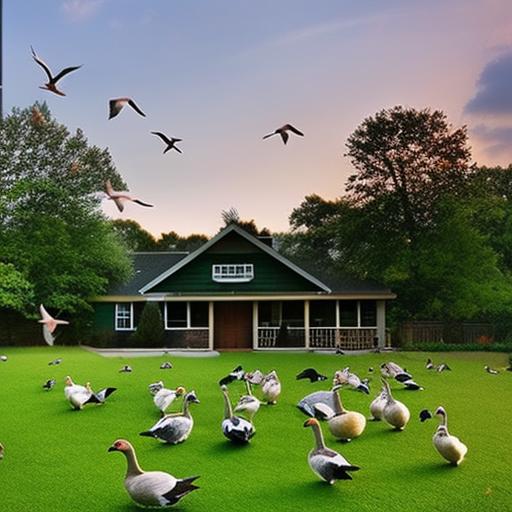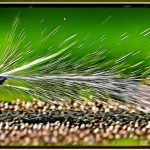Geese on lawns can be a nuisance for many homeowners. They leave behind droppings that can be unsightly and difficult to clean up, and they can also cause damage to the grass and plants on your property. Understanding the behavior of geese on lawns is important in order to effectively deter them and maintain a goose-free lawn. In this article, we will explore the habits and behaviors of geese on lawns, identify the reasons why they flock to lawns, and provide various methods for keeping them away.
Key Takeaways
- Geese are attracted to lawns because they provide easy access to food and water.
- Natural ways to keep geese away include planting tall grasses and using reflective tape.
- Physical barriers like fences and netting can prevent geese from entering your lawn.
- Decoys like fake predators and dogs can deter geese from landing on your lawn.
- Sound and light deterrents like sirens and lasers can scare geese away.
Understanding the behavior of geese on lawns
Geese are social animals that often gather in large flocks. They are attracted to lawns because they provide open spaces where they can easily spot predators and have a clear line of sight. Lawns also offer easy access to food sources such as grass, insects, and seeds. Geese are grazers and will feed on the grass, causing damage to the lawn in the process.
Geese are also attracted to lawns because they provide a safe environment for nesting and raising their young. Lawns near bodies of water, such as ponds or lakes, are particularly attractive to geese as they offer both food and water sources in close proximity.
Identifying the reasons why geese flock to lawns
There are several reasons why geese are attracted to lawns. One of the main reasons is the availability of food sources. Lawns provide a buffet of grass, insects, and seeds that geese find appealing. Additionally, lawns near bodies of water often have an abundance of aquatic plants and algae that geese feed on.
Another reason why geese flock to lawns is for safety. Geese prefer open spaces where they can easily spot predators approaching. Lawns provide this visibility, allowing geese to quickly react and take flight if necessary.
Lastly, lawns near bodies of water offer an ideal nesting and breeding ground for geese. The proximity to water provides easy access to food and a safe environment for raising their young.
Natural ways to keep geese away from your lawn
If you want to keep geese away from your lawn without using harmful chemicals or methods, there are several natural ways to deter them. One method is to plant certain types of vegetation that geese find unappealing. Geese prefer short, manicured grass, so allowing your lawn to grow longer can discourage them from landing. Planting tall grasses or shrubs around the perimeter of your lawn can also create a barrier that geese are less likely to cross.
Another natural deterrent is the use of predator decoys. Placing decoys such as plastic owls or coyotes on your lawn can trick geese into thinking the area is already occupied by a predator, causing them to avoid it.
Creating a physical barrier to prevent geese from entering your lawn
Creating a physical barrier is another effective way to keep geese off your lawn. Fences or netting can be installed around the perimeter of your property to prevent geese from entering. It is important to ensure that the fence or netting is tall enough and properly secured to prevent geese from flying over or under it.
Another option is to install floating barriers in bodies of water near your lawn. These barriers create a physical barrier that prevents geese from accessing your lawn from the water.
Using decoys to deter geese from landing on your lawn

Decoys can be an effective way to deter geese from landing on your lawn. Placing decoys such as swans or herons near bodies of water can create the illusion of competition for resources, causing geese to seek out other areas.
It is important to regularly move the decoys around to prevent geese from becoming accustomed to their presence. Additionally, using decoys that have moving parts, such as ones that rotate or flap their wings, can make them appear more realistic and increase their effectiveness.
Implementing sound and light deterrents to scare geese away
Sound and light deterrents can be effective in scaring geese away from your lawn. Motion-activated devices that emit loud noises or flashing lights can startle geese and make them feel unsafe, causing them to leave the area.
There are also devices available that emit distress calls of geese or other bird species. These calls can signal danger to geese and deter them from landing on your lawn.
Installing sprinklers to keep geese off of your lawn
Sprinklers can be a simple yet effective way to deter geese from landing on your lawn. Geese do not like getting wet, so installing sprinklers that are activated by motion sensors can startle them and discourage them from landing.
It is important to position the sprinklers strategically to cover the areas where geese are most likely to land. Regularly changing the timing and pattern of the sprinklers can also prevent geese from becoming accustomed to their presence.
Using repellent sprays to discourage geese from approaching your lawn
Repellent sprays can be used to create an unpleasant environment for geese and discourage them from approaching your lawn. These sprays typically contain natural ingredients such as grape extract or garlic oil, which have strong odors that geese find unappealing.
To use repellent sprays, simply apply them to the areas where geese are likely to land or graze. It is important to reapply the spray regularly, especially after rain or heavy dew, as it may wash away.
Working with a professional pest control service to keep geese away
If you are struggling to keep geese away from your lawn, it may be beneficial to work with a professional pest control service. These professionals have the knowledge and experience to effectively deter geese and can provide customized solutions based on your specific situation.
When choosing a pest control service, it is important to look for a reputable company that uses humane methods and is licensed and insured. They should also have experience in dealing with geese and be able to provide references from satisfied customers.
Developing a long-term plan to maintain a goose-free lawn
Maintaining a goose-free lawn requires a long-term plan and consistent effort. Regularly cleaning up debris such as fallen leaves or grass clippings can help discourage geese from landing on your lawn, as they prefer clean, open spaces.
Keeping vegetation trimmed and maintaining a healthy lawn can also make it less attractive to geese. Geese prefer short, manicured grass, so allowing your lawn to grow longer can deter them from landing.
Lastly, it is important to address any water sources near your lawn that may be attracting geese. Removing or modifying these water sources can make your property less appealing to geese.
Geese on lawns can be a frustrating problem for homeowners, but understanding their behavior and implementing effective deterrents can help maintain a goose-free lawn. By using natural methods such as planting certain types of vegetation or installing physical barriers, as well as utilizing decoys, sound and light deterrents, sprinklers, repellent sprays, or working with a professional pest control service, you can successfully keep geese away from your lawn. Developing a long-term plan that includes regular maintenance and addressing any water sources near your property will help ensure that your lawn remains goose-free.
If you’re tired of dealing with geese invading your lawn, you’ll definitely want to check out this helpful article on how to keep geese off of your property. But that’s not all – if you’re interested in poultry, you might also want to explore this informative piece on whether quails sit on their eggs. And if you’re a chicken owner looking for some inspiration, don’t miss this fantastic article showcasing creative interior ideas for your chicken coop. Plus, if you’ve ever considered having a garden chicken coop, this article will provide you with all the tips and tricks you need to make it a reality. So why wait? Start exploring these fascinating articles today!
FAQs
What are some effective ways to keep geese off of my lawn?
There are several methods that can be effective in keeping geese off of your lawn, including using decoys, installing fencing or netting, using repellents, and modifying the landscape.
What types of decoys can be used to deter geese?
Decoys that resemble natural predators of geese, such as coyotes or owls, can be effective in deterring geese. Some decoys also emit sounds or have moving parts to make them more realistic.
What types of fencing or netting can be used to keep geese off of a lawn?
Fencing or netting that is at least 3-4 feet tall can be effective in keeping geese off of a lawn. Electric fencing can also be used, but it should be installed by a professional.
What types of repellents can be used to keep geese off of a lawn?
Repellents that contain methyl anthranilate, a grape extract, can be effective in deterring geese. Other repellents include those that emit loud noises or flashing lights.
How can the landscape be modified to keep geese off of a lawn?
Modifying the landscape can include planting tall grasses or shrubs around the perimeter of the lawn, creating steep slopes or water features, or installing barriers such as rocks or logs. These modifications can make the lawn less attractive to geese.
Meet Walter, the feathered-friend fanatic of Florida! Nestled in the sunshine state, Walter struts through life with his feathered companions, clucking his way to happiness. With a coop that’s fancier than a five-star hotel, he’s the Don Juan of the chicken world. When he’s not teaching his hens to do the cha-cha, you’ll find him in a heated debate with his prized rooster, Sir Clucks-a-Lot. Walter’s poultry passion is no yolk; he’s the sunny-side-up guy you never knew you needed in your flock of friends!







